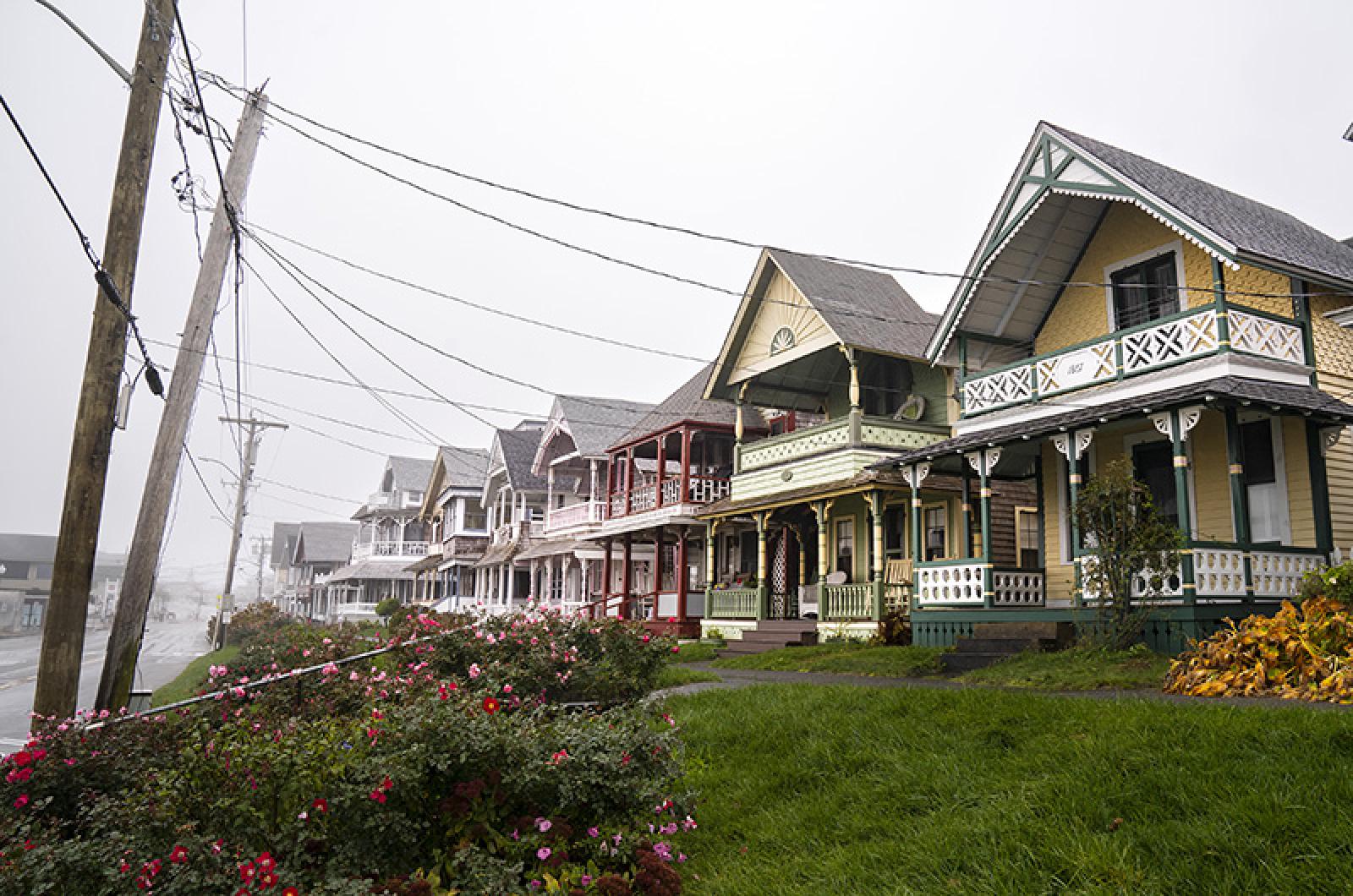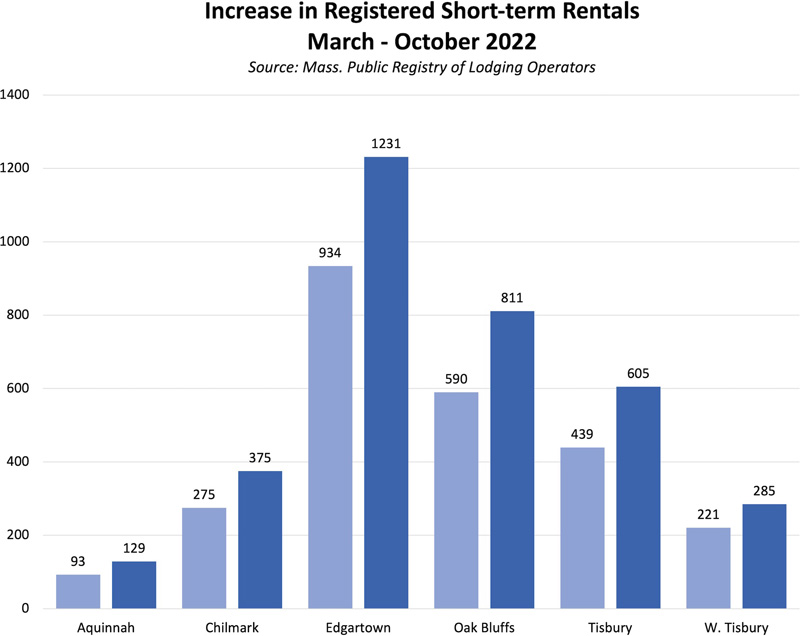The number of homes on Martha’s Vineyard registered as short-term rental properties shot up by 35 per cent over the summer, with significant increases in every Island town.
Realtors, rental agents and listing agencies say the increase may be due in part to delayed compliance with a state law enacted in 2018 that required homeowners to register rentals starting on July 1, 2019. Anyone who rents a property for fewer than 31 days a year is required to register with the state, though only those that rent for more than 14 days are required to pay taxes.
But industry professionals also pointed to booming demand from visitors and a growth in home sales as investment properties in explaining the increase, adding pressure to the Island’s limited year-round housing stock as real estate prices continue to shoot upward.
Since March of 2022, the Island as a whole has added 884 properties to the state’s short-term rental tax database, from 2,552 to 3,436 in October. Edgartown has added 297 properties, Oak Bluffs has added 221, Tisbury has added 166, Chilmark has added 100, West Tisbury has added 64 and Aquinnah has added 36.
Joan Talmadge, who is an owner of the rental listing site WeNeedaVacation.com, which lists properties on Martha’s Vineyard, Nantucket and Cape Cod, said that the site had added about 100 properties each month this spring, and that the Island had seen an increase of approximately 45 Martha’s Vineyard listings more recently, from 435 to about 480. Ms. Talmadge said she expected that number to grow to more than 500 throughout the fall, as more homeowners sign up for the summer season.
Ms. Talmadge attributed the growth in short-term rental inventory to multiple factors. When the state extended the lodging tax, formerly levied only on hotels and motels, to homes in 2019, many longtime renters pulled their homes from the market. Then, when the pandemic struck in 2020, another wave of homeowners stopped renting, either because they had concerns about the virus or because they decided to move into properties they otherwise might rent.
“A lot of those pandemic folks are coming back online,” Ms. Talmadge said.
As the virus has further abated, Ms. Talmadge said the short-term rental market has stormed back in even greater force — with significantly more listings and inquiries than in pre-pandemic years. She attributed that growth to broader shifts in the real estate market on the Island, with prices skyrocketing and the increasingly common use of Island homes as investment properties. She said the majority of new listings coming online are from people who have recently bought or renovated a home for rental.
“The other factor is that due to the hot housing market in the last couple of years, many people bought homes as investments, perhaps as future retirement homes. And in the meantime, they realized they could rent the property,” Ms. Talmadge said. “Many people who first buy a home here, they realize, well, we can’t afford to just vacation here in the summer. We have to rent it out. That’s the deal we made with the devil.”
On the Island as well as statewide, tax revenue from short-term rentals has been on a sharp incline. In its first year, from July 1, 2019 through June 30, 2020, short-term rentals generated $34 million in new revenue for the state and $32.8 million for Massachusetts cities and towns. Those amounts rose to $40.6 million and $37.5 million for the year ending June 30, 2021, according to state Department of Revenue figures.
Though the state will not release total 2021-2022 figures until January 2023, preliminary figures from the Department of Revenue show that short-term rental taxes collected by the state, including local taxes that will be returned to Island towns, are poised for another big increase.
Anne Mayhew, who works with Sandpiper Rentals, said that her listing company also saw an increase in short-term rental inventory this summer, adding about 50 properties to its 650-home inventory. While Ms. Mayhew said the 50-property increase didn’t represent a spike, and attributed part of the growth to former renters coming back into the fold, she also pointed to an increase in investment properties on the Island.
“We are seeing some more high-end rentals, and there is a very high demand for them,” Ms. Mayhew said. “We’ve always had it, but there’s definitely a lot of money coming into the real estate market here, and it’s often investment, rather than just buyers who might want to use it themselves and also rent it.”
Demand for the Island grew during the pandemic, Ms. Talmadge said, particularly as international travel became more challenging, privacy became more desirable and work-from-home jobs became more commonplace.
“I think that the pandemic changed the whole fabric of vacation rentals,” Ms. Talmadge said. “These vacationers, if they have not rented a vacation home before, their expectations are perhaps higher. They expect more, maybe a hotel type experience. Years ago, you’d rent a cottage and be responsible for cleaning it. That’s not the case anymore.”
The Island has a long tradition of seasonal short-term rentals buoying year-round Vineyard homeowners, who list their properties for the busiest months of the summer to help pay their mortgage, often through companies like Sandpiper or WeNeedaVacation. But there has been a proliferation of luxury real estate companies setting up shop on the Vineyard in recent years, even beyond the advent of online companies like Airbnb and Vrbo. The hotels and villas arm of the Marriott Bonvoy now lists more than 20 homes on the Island, and rental management companies like Vacasa and Evolve have made significant in-roads as well, even sending new homeowners unsolicited mailings or letters asking if they are interested in listing their property as a short-term rental.
A copy of a letter from Evolve obtained by the Gazette and sent to a new homeowner on-Island says that the company offers a 10 per cent management fee to market and help book the property.
“Congratulations on purchasing a home in Vineyard Haven!” the letter begins. “Did you know that your new home could generate a lot of income for you every year as a vacation rental?”
Bill Rossi, a member of the Chilmark select board and Island realtor with Compass, said that most of his Island buyers are still people looking to live in the homes they purchase. But the lucrative rental market is also helping to drive the real estate market, he said.
“A lot of the properties I’ve been involved with, people want to use the property some of the time, but they definitely want to take advantage of the rental market,” Mr. Rossi said. “And there are rental companies looking for people to buy luxury properties and give them a guaranteed amount of rental income.”
The proliferation of short-term rentals has become a topic of discussion among Island leaders and housing advocates, including at a recent joint Vineyard-Nantucket meeting and at all-Island planning board meetings.
“There obviously is a problem with people being able to afford to live here because prices have gone up so high due to the pandemic,” Mr. Rossi said, also pointing to the inventory issue. “I think the housing bank, if that goes through, might take care of a lot of that problem. But we’re in a little bit of a gray area in terms of how it’s going to end up.”
Mr. Rossi said that he recently sold a home in Edgartown to an agent working with a company called Inspirato, which offers luxury vacation rentals. The 4,000 square foot, six-bedroom Katama home is the company’s first listing on Martha’s Vineyard, and will be used exclusively for rentals, Mr. Rossi said. It has a heated private pool and is a ten minute drive from South Beach. Inspirato listed it under the name “Harthaven.”







Comments (47)
Comments
Comment policy »